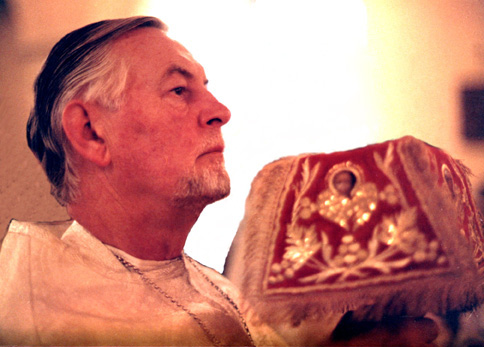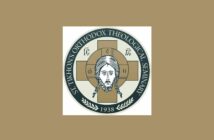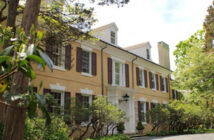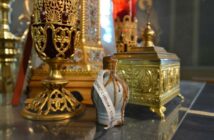Source: Orthodox Church in America
SYOSSET, NY [OCA] – Friday, December 13, 2013, the Feast of Saint Herman of Alaska, marks the 30th anniversary of the repose of Protopresbyter Alexander Schmemann, Dean of Saint Vladimir’s Seminary and a leading 20th century Orthodox Christian theologian.
Father Alexander was born in Estonia in 1921 to a family of Russian emigres. He spent his youth in France, where he received his secondary and university educations. He also completed theological studies at the Orthodox Theological Institute of Saint Sergius in Paris, which at that time was the center of Russian Orthodox scholarship after the turmoil of the Russian Revolution of 1917.
Ordained to the priesthood in 1946, he taught Church history at Saint Sergius Institute until 1951, when he was invited to join the faculty of Saint Vladimir’s Seminary, at that time located in New York City. He was soon recognized as a leading exponent of Orthodox liturgical theology, which sees the liturgical tradition of the Church as a major sign and expression of the Christian faith.
Father Alexander received his doctorate on July 5, 1959 from the Orthodox Theological Institute of Saint Sergius, having defended his dissertation, “Tserkovny Ustav: Opyt Vvedeniia v Liturgicheskoe Bogoslovie” [“The Church’s Ordo: Introduction to Liturgical Theology”]. He held honorary degrees from Butler University, General Theological Seminary, Lafayette College, Iona College, and Holy Cross Greek Orthodox School of Theology.
In addition to teaching at Saint Vladimir’s, Father Alexander held positions as adjunct professor at Columbia University, New York University, Union Seminary, and General Theological Seminary in New York and was a popular guest lecturer at many universities throughout the country. He was also active as a representative of the Orthodox Church in the ecumenical movement, and held positions in the Youth Department and the Commission on Faith and Order of the World Council of Churches.
Appointed Dean of Saint Vladimir’s Seminary in 1962 – a position he held until his repose – he was instrumental in educating a generation of Orthodox Christian priests. During his tenure, the seminary achieved widespread recognition as a center of Orthodox theological studies.
Father Alexander was active in the establishment of the Orthodox Church in America as an autocephalous Church in 1970, at which time the former “Metropolia” became officially independent from the Russian Orthodox Church, dedicating itself to the unity of the Orthodox Church in North America. While committed to the cause of an Orthodox Church which would be united and American, he always remained concerned with the fate of believers in the Soviet Union. For 30 years, his sermons were broadcast in Russian on “Radio Liberty,” gaining Father Alexander a broad following across the Soviet Union and elsewhere. Alexander Solzhenitzyn, while still in the Soviet Union, was one of his auditors and remained his friend after emigrating to the West.
Over a dozen books written by Father Alexander have been published in multiple languages and continue to be widely circulated, including For the Life of the World; Introduction to Liturgical Theology; Ultimate Questions; Church, World, Mission; and numerous articles and tracts. For the Life of the World, a popular volume on Christian faith as reflected in liturgy, has been translated into numerous languages and remains one of the most popular works on Christianity for the general public. He completed a major study on the Eucharist only weeks before his death.
Since his repose, Saint Vladimir’s Seminary has hosted the Annual Father Alexander Schmemann Memorial Lecture. This year’s lecture, titled “On ‘The Mystical Theology of the Eastern Church’” will be delivered by Archpriest Dr. John McGuckin, a leading international commentator on Eastern Orthodox theology and early Christian history. The free and public lecture will be held on Friday, January 31, 2014, after an academic convocation at 7:30 p.m., during which Father John will be awarded a Doctor of Divinity degree honoris causa. Father John is professor of Byzantine Christian Studies at Columbia University, and Union Theological Seminary’s Ane Marie and Bent Emil Nielsen Professor in Late Antique and Byzantine Christian History. Additional information may be found on the seminary’s web site.
May Father Alexander’s memory be eternal!
For a wealth of additional information and links please visitwww.schmemann.org.
[subscribe2]




1 Comment
Father Alexander Schmemann
… One “YES” December 13, 2013
“Jesus Christ…having abolished in His flesh the enmity, that is, the law of commandments contained in the ordinances, created in himself one new man from the two, thus making peace.” (paraphrase of part of last Sunday’s epistle, Ephesians 2:15)
A brief thirty years have passed since the death of Fr Alexander Schmemann—a lifetime for a younger generation of intelligent church leaders and a mere moment for those who personally knew him. I am among those older people who can easily claim that Fr Alexander single-handedly and very personally shaped our theology, and therefore influenced a great part of our lives. In fact, his influence on my generation was so profound that we find ourselves struggling to incorporate his vision often troubled by a very different approach that occupies religion today. Fr Schmemann’s own published Journals testify to his personal struggle with the divergent visions of the Church.
What largely marks Fr Alexander’s vast legacy of lectures, sermons, and essays was his caution against what he called reductions, that is, the tendency to obsess over isolated issues, and consequently to idolize them, to turn them into a cause and a source of division and conflict. To avoid such reductions, he constantly urged us not to be tempted to “solve” the Church’s deficiencies or to idealize some bygone time or era when things were perfect. Rather, he encouraged us to look deeper at the dimension of the Kingdom of God already permeating human life. The Church’s role is to bring us into a closer union with that experience of the Kingdom, but the Church as such is NOT a substitute for that experience, rather, She reveals that experience to us. Christ came to restore and bring God’s world to the Father, and not to establish a self-absorbed cult.
Fr Alexander warned against religious activism, teaching instead a wholesome engagement with the world through mission. But this idea of mission was not the conventional notion we have today of multiplying converts in order to fill the pews. For him, this mission did not consist in theological controversies or religious activity, but the bringing of one’s own transfigured life into daily engagement with the neighbor, the one in front of me at this moment. The man who shares Fr Alexander’s day of death, Herman of Alaska, was a simple monk leading a secluded life in the wilderness, and yet his influence was so vast that he became America’s first recognized saint.
Just as the Kingdom of God cannot be reduced to an easy definition, or to religious activism so too, the persons who are beloved by God, cannot be reduced to their functions or their virtues and vices. It is notable that while Fr Alexander could be the harshest critic of human behavior, he maintained the deepest respect for the individual person, always knowing that this particular person is the object of God’s love and salvation. We live in a time of constant anxiety and therefore of personal recrimination—we often need to blame someone for the way we feel. It is hard for us to understand that we are on our journey together, and that only by continuing together to offer our broken lives in the Eucharistic gathering, can we overcome the alienation we experience, and the hostility that marks our times even and especially within the Christian family.
In the culture that formed Fr Alexander it was inconceivable for Orthodox people to be solely concerned with the development and future of their own Orthodoxy. While he was convinced of the fullness of Orthodox life and teaching, he understood that Orthodoxy, and its experience of that very Kingdom which he preached, was the source from which one reaches always outside oneself. That explains his engagement with others on the ecumenical stage. No doubt he would have continued to express some bitterness over many of the externals that define Orthodox today. I am thinking specifically about the interest in certain circles of the restoration of old country architecture, the fascination with forms of apparel and conduct, preoccupation with rubrics, and an assault on cultural norms and morality—all of which suggests the preservation of a romantic Orthodox “Age” to counter a perceived secularism. If the world is indeed gone secular, one has to wonder about the sudden and growing appeal of Pope Francis who preaches a very humane restoration of human relationships. Why is his spirituality so attractive to a younger generation that supposedly has no interest in the Church? Doesn’t one have to ask what digressions in religion drove that generation away in the first place?
Just as we see the restoration beginning today with Pope Francis on a one to one personal basis, so too, for Fr Alexander, theological engagement and progress is only possible among individual persons willing to be actively engaged with one another, not on the level of polemics and ideas and conferences, but in dialogue and action rooted in love and in the joyful exuberance that Christ’s victory over death has come. For me, the most fascinating aspect of his personality was his ability to confront any deviation from truth directly in a good solid debate, without ever reducing his “opponent” to an object, or a hurdle to overcome, an enemy to conquer—but rather seeing that person as a beloved soul that he hoped both to learn from and to convince with truth and patience.
My friend Deacon Peter Danilchik likes to describe how he had once asked Fr Schmemann whether he should confront another cleric whose actions he deplored. Fr Schmemann answered: “Of course, but only if you know that your motivation is borne out of love!” In Father’s published journals it is especially clear that such confrontations were the order of his professional life, not excluding the hallowed halls of his own beloved Seminary. No parish can claim that such conflicts are not present in their own daily lives—it is simply the human condition. But the antidotes are not far away, for this split—these conflicts—are first of all inside each of us. If I would but only see that my anger against a neighbor has first taken root by a division within myself; and that when I confront my own internal division, I can only then properly confront in love my neighbor. Here lies the essence of St.Paul’s words to the Ephesians in the heading above. The famous “dividing wall of hostility between the two” which Christ overcomes, is none other than the hostility working in my own soul, the war between the Old and New Adam within me.
If we are to discover the particularity of Fr Alexander’s teaching today, it does not lie in some complex theological formulations, in some innovative theology that he developed. Rather, his gift is the real incarnation of Christian truth in his own person. When Veselin Kesich said at Fr Schmemann’s funeral that “he was a free man in Christ, a man filled with humor and stories”, he defined once and for all the “what” of Fr Schmemann. The “who” will always be an irreducible mystery, but his “what” is exactly this freedom and lightness of life. And for him this was the conviction that Christ has come and death is no more.
I am personally convinced that is the reason that Father Alexander is not only NOT dead, but continues to grow and flourish in the Church’s consciousness day by day. I believe that his legacy is only now beginning to take root, that having lived a brief while “without” him, so to speak, the Church is beginning again to live with him. To me it seems ironic that this “free man in Christ”, who eschewed all forms of outward piety, who smoked Gitanes (which may have proved his physical demise) and loved a good beefsteak, is headed toward the road of sanctity, or more accurately perhaps, has by his honest and open life already shown us what a contemporary true and saintly human being looks like! He has shown us that we are all indeed potential “saints” bound by our desire to offer our broken and healed selves to the God who came, and is coming in this season of Advent light, to be one with us, and raise us to Himself!
by Alexis Vinogradov 12.13.13